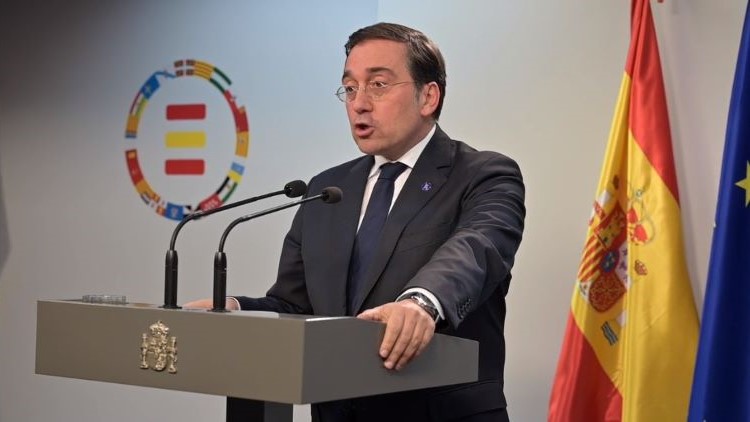Eduardo González
The Minister of Foreign Affairs, José Manuel Albares, announced yesterday in Brussels Spain’s support for the imposition of a European sanctions regime against the Islamic Resistance Movement (Hamas) and against Israeli “violent settlers” in the occupied Palestinian territories.
“We have agreed that the settlement policy and the violence of Hamas both hinder peace and prevent the materialization of the two-state solution and that the settlement policy is contrary to and violates international law,” the Minister stated at the press conference following the Foreign Affairs Council (FAC).
For this reason, he continued, the representatives of the 27 Member States discussed the imposition of “a sanctions regime for Hamas and also for those violent settlers” and the EU High Representative for Foreign and Security Policy, Josep Borrell, “has been mandated to make a proposal on what is, at this time, a political decision”.
Borrell himself acknowledged yesterday that there is still no consensus on this proposal and that it is not clear that all states support a possible “linkage” between sanctions on Hamas and, at the same time, sanctions on the settlers. “They are not linked, but many of us, and Spain has been one of them, have spoken of the enemies of peace, of those who through their actions hinder or prevent the materialization of the two-state solution,” Albares declared in this regard. “They are two different regimes,” he warned. “Hamas is recognized as a terrorist organization by the EU, but it has considered advancing in that sanctions regime and the same path has also been considered for the violent settlers,” he added.
The minister did not clarify whether Spain could impose unilateral sanctions on violent settlers in case there is no consensus on this, as the French and Belgian governments have already announced. “We are going to wait for the High Representative to present his proposal for a sanctions regime, but I have seen significant support for such measures and Spain is certainly in favor,” he said.
At the press conference following the FAC yesterday, Borrell announced the possible imposition of sanctions against Israeli settlers who have increased violent acts against Palestinians in the West Bank. “The time has come to move from words to deeds,” he declared. “It is too many acts of violence and too many dead,” he continued. “I have not yet put the proposal on the table, but I will put it on the table, my services are working on a list of people who commit attacks in the West Bank and we will propose a list of sanctions against them and the member states will decide whether to accept these measures,” he added.
Possible sanctions could include a visa ban or increased monitoring of products manufactured in Israeli settlements. The United States has already assured that it will not extend visas for Israeli settlers. However, the lack of consensus in the EU on the Middle East conflict could complicate the imposition of sanctions against settlers, which would not be as easy as the first sanctions against Russia at the beginning of the war in Ukraine.
During the FAC, Albares continued, Spain advocated “a humanitarian cease-fire that is consolidated, that is sustainable” in Gaza, a proposal that, he assured, has had the support of other countries that have been “in agreement with the substance of the idea, no matter what it is called”. Likewise, the Minister defended “the maintenance and arrival of European cooperation funds to the Palestinian National Authority, which is our partner for peace, unlike Hamas, which does not want peace, only suffering and destruction”, and asked, in this sense, that the EU support the Palestinian National Authority “to be one of the elements that break this spiral of violence” and “take charge of the Gaza Strip the day the weapons are silenced”.
The Foreign Minister also insisted on “the Spanish idea” of an International Peace Conference “as a way of guaranteeing that we will not see this violence again and that it has to end, obviously, with the materialization of the two-state solution”, which “also implies the recognition of a Palestinian State”, and assured that the 27 showed a “very large majority” support for the work of the UN Secretary General, António Guterres, in the Middle East crisis.
Six Hispano-Palestinians leave Gaza
On the other hand, Albares announced at the same press conference that six Spanish-Palestinian citizens and their families left the Gaza Strip yesterday for Egypt through the Rafah border crossing. “Today there has been happy news for Spain: six Spanish-Palestinians and six of their relatives have been able to leave Gaza through the Rafah crossing and are now on their way to Cairo,” he said. At this moment there are no Spanish citizens left in Gaza. During the first repatriation operation, about 140 people were able to leave the territory.







